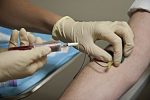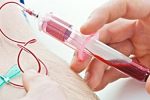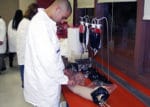 Once you have made the decision that phlebotomy is the career for you, it is time to choose the phlebotomy course that is right for you. As you begin to look for the right course, there are several questions you need to answer:
Once you have made the decision that phlebotomy is the career for you, it is time to choose the phlebotomy course that is right for you. As you begin to look for the right course, there are several questions you need to answer:
- Are you eligible for phlebotomy training?
- What does your state require?
- If you work in a facility, what do they require?
- What does program accreditation mean, and why is it important?
- What are the pros and cons of online training versus classroom training?
- What is the cost of phlebotomy training courses?
- What will I learn in a phlebotomy certification course?
- Do you want to get a degree along with your phlebotomy training?
- How do you know what programs are available close to you?
- What are the next steps?
Each of these steps are included in the table of contents for your convenience:
Are you eligible for phlebotomy training?
First things first. The first step to selecting a phlebotomy program is to determine if you are eligible for the training, and if you have what it takes to be a phlebotomist. Your state may have additional requirements to become a phlebotomist, but there are typically some general requirements that you must meet in any state to qualify for phlebotomy training:
- A high school diploma or a high school GED;
- 18 years of age or older;
- Up-to-date on vaccinations since you will likely be working with sick people;
- Enough money or a funding source to finance education.
Also, many programs may evaluate some of the “soft skills” that are necessary to be successful in phlebotomy. Even if the programs you consider do not ask about these skills, you should take a look at these to determine if you have them:
- People skills – working with teams and patients
- Manual skills – working with your hands
- Skills within the organization – following the policies and procedures and using supplies wisely
| People Skills | Manual Skills | Skills Within the Organization |
|
|
|
What does your state require?
When looking at training programs, it is important to know what your state requires – licensure, certification, both, or neither? Does the state require a formal course of study or is on-the-job training acceptable? Who can you contact with questions about state requirements?
“Licensure” is a state-mandated and sanctioned process in which you apply for and receive permission from the state to practice as a phlebotomist. Typically, you must pass a course and then pass an exam before you are licensed. To legally practice, you MUST have a license.
“Certification” refers to the process in which an organization recognized by the state has deemed that you have met requirements and are minimally competent to perform certain tasks. Certification does NOT mean that you are licensed as a phlebotomist in those states that require licensure. That is a separate process.
The links in this table will provide a direct link to the appropriate department or links to phone numbers that you can use for more information for your particular state.
| State | License Required? | Certification Required? | Phlebotomy Training Required? | State Agency that Regulates Phlebotomy |
| Alabama | No | No | Yes | Alabama Department of Public Health (http://alabamapublichealth.gov/) |
| Alaska | No | No | No | Alaska Department of Health and Social Services (http://dhss.alaska.gov/dhcs/Pages/hflc/State-regs.aspx) |
| Arizona | No | No | Yes | State of Arizona Administrative Code (https://azsos.gov/rules/arizona-administrative-code) |
| Arkansas | No | Maybe | No | Arkansas Department of Health (https://www.healthy.arkansas.gov/rules-and-regulations) |
| California | No | Yes | Yes | California Department of Public Health (https://www.cdph.ca.gov/Programs/OSPHLD/LFS/ Pages/Phlebotomist.aspx) |
| Colorado | No | Yes | Yes | Colorado Department of Regulatory Agencies (https://colorado.gov/dora/) |
| Connecticut | No | No | Yes | Connecticut eRegulations on CT.gov (https://eregulations.ct.gov/eRegsPortal/) |
| Delaware | No | No | No | Division of Professional Regulations (https://dpr.delaware.gov/infoguide/) |
| Florida | No | No | Yes | Florida Department of Health (http://www.floridahealth.gov/licensing-and-regulation/) |
| Georgia | No | Maybe | No | Georgia.Gov (https://georgia.gov/agency-list) |
| Hawaii | No | No | Yes | State of Hawaii Department of Health (http://health.hawaii.gov/) |
| Idaho | No | Maybe | Yes | Idaho Department of Health and Welfare (https://healthandwelfare.idaho.gov/Medical/ LicensingCertification/tabid/124/Default.aspx |
| Illinois | No | No | Yes | Illinois Department of Public Health (http://dph.illinois.gov/licensing-certification) |
| Indiana | No | No | Yes | Indiana State Department of Health (https://www.in.gov/isdh/) |
| Iowa | No | No | No | State of Iowa Department of Regulations and Appeals (https://dia-hfd.iowa.gov/DIA_HFD/Home.do) |
| Kansas | No | No | No | Kansas.gov |
| Kentucky | No | Maybe | Yes | Kentucky.gov |
| Louisiana | Yes | Yes | Yes | Louisiana Department of Health (http://ldh.la.gov/) |
| Maine | No | No | Yes | Maine State Board of Nursing (https://www.maine.gov/boardofnursing/) |
| Maryland | No | No | Yes | Maryland Department of Health (https://health.maryland.gov/pages/home.aspx) |
| Massachusetts | No | Maybe | Yes | Massachusetts Bureau of Health Professions Licensure (https://www.mass.gov/orgs/bureau-of-health-professions-licensure) |
| Michigan | No | Maybe | No | Michigan Department of Licensing and Regulatory Affairs (https://www.michigan.gov/lara/0,4601,7-154-89334_72600_85566—,00.html) |
| Minnesota | No | No | Yes | Minnesota Department of Health (https://www.health.state.mn.us/facilities/providers/ compalt/licboards.html) |
| Mississippi | No | No | No | Mississippi State Department of Health (https://msdh.ms.gov/msdhsite/_static/30.html) |
| Missouri | No | Maybe | Yes | Missouri Professional Registration & Licensing (https://www.mo.gov/work/professional-registration-licensing/) |
| Montana | No | No | Yes | Montana Department of Labor & Industry (http://bsd.dli.mt.gov/) |
| Nebraska | No | Maybe | Yes | Nebraska Department of Health and Human Services (http://dhhs.ne.gov/Pages/default.aspx) |
| Nevada | Yes | Yes | Yes | Nevada Department of Health and Human Services (http://dhhs.nv.gov/) |
| New Hampshire | No | Maybe | Yes | New Hampshire Department of Health and Human Services (https://www.dhhs.nh.gov/) |
| New Jersey | No | No | No | State of New Jersey Department of Health (https://nj.gov/health/legal/) |
| New Mexico | No | No | No | New Mexico Department of Health (https://nmhealth.org/about/dhi/hflc/) |
| New York | No | No | Yes | New York State Department of Health (https://www.health.ny.gov/permits/) |
| North Carolina | No | No | Yes | North Carolina Secretary of State (https://www.sosnc.gov/divisions/licensing_boards) |
| North Dakota | No | Maybe | Yes | ND.gov (https://www.nd.gov/working-nd/tools-resources) |
| Ohio | No | Maybe | Yes | Ohio Department of Education (http://education.ohio.gov/Topics/Ohio-s-Graduation-Requirements/Industry-Recognized-Credentials-and-WorkKeys/Industry-Recognized-Credentials/Health) |
| Oklahoma | No | No | Yes | Oklahoma State Department of Health (https://www.ok.gov/health/Forms,_Regulations, Licensing/ Forms, _Regulations,_Licensing.html |
| Oregon | No | Maybe | Yes | State of Oregon Higher Education Coordinating Commission (https://www.oregon.gov/highered/pages/index.aspx) |
| Pennsylvania | No | No | Yes | Pennsylvania Department of Health (http://pennwatch.pa.gov/Pages/pa-agencies.aspx) |
| Rhode Island | No | Maybe | Yes | State of Rhode Island Department of Health (http://health.ri.gov/licenses/detail.php?id=215) |
| South Carolina | No | No | Yes | SC.gov (https://sc.gov/HealthAndSafety/Pages/LicensesPermits AndRegulations.aspx) |
| South Dakota | No | No | No | South Dakota Department of Health (http://doh.sd.gov/) |
| Tennessee | No | No | Yes | Tennessee Department of Health (https://www.tn.gov/health/health-program-areas/health-professional-boards/) |
| Texas | No | No | No | Texas Health and Human Services (https://hhs.texas.gov/doing-business-hhs/licensing-credentialing-regulation) |
| Utah | No | No | No | Utah Department of Health (https://health.utah.gov/contact) |
| Vermont | No | Maybe | Yes | Vermont Department of Health (https://www.healthvermont.gov/) |
| Virginia | No | No | Yes | Virginia Department of Health Professions (http://www.dhp.virginia.gov/) |
| Washington | Yes | Yes | Yes | Washington State Department of Social and Health Services (https://www.dshs.wa.gov/) |
| West Virginia | No | No | No | WV.gov (https://www.wv.gov/pages/licenses.aspx#undefined) |
| Wisconsin | No | No | No | Wisconsin Department of Health Services (https://www.dhs.wisconsin.gov/regulations/index.htm) |
| Wyoming | No | No | No | Wyoming Department of Health (https://health.wyo.gov/) |
Retrieved from online search of state websites on July 30, 2019
Regardless of the requirements in the state, your chances of getting a job are MUCH better if you are certified by one of the certification organizations. National certification will also mean you can move to a state that DOES require certification if you decide to move in the future. Certification shows a potential employer that you are serious about being the best phlebotomist you can be!
If you work in a facility, what do they require? Do they have a course available that you can take in the facility?
In the table above, you might have noticed that there is a “maybe” in the Certification Required column. Some facilities do require certification even if the state does not. When you are looking for work as a phlebotomist, it is important to ask each potential employer if they require certification. If you work at a facility that has a training program in place, it is likely that you will be able to do on-the-job training with a mentor who can teach you some of the tricks they have learned. If your employer requires training beyond what they provide, they may have a relationship with a local program that you can enter for a reduced fee. Many employers offer financial help for their employees who want to continue their education. Be sure to ask when you are hired what your options might be!
What does program accreditation mean, and why is it important?
Accreditation means that the program has passed an evaluation process that verifies that the program meets the minimal standards for a quality phlebotomy education. Phlebotomy program accreditation usually occurs through the National Accrediting Agency for Clinical Laboratory Sciences (NAACLS).
Any program you take should be accredited by one of the agencies that provide accreditation of phlebotomy programs. Even if your state does not require an accredited program, a state that you work in in the future may require that the program be accredited. Also, if you select an accredited program, you can be sure that the training you get will be what you need to get started in your new career. Be sure to ask if the programs you are considering are accredited; if not, keep looking for a program that IS accredited.
What are the pros and cons of online training versus classroom training?
Once you decide that you want formal phlebotomy training, it is time to select a training program. Again, the first step you should take is to check with your state agency to see if they have requirements for the program(s) that they will recognize.
| Online Training Pros | Online Training Cons | Classroom Training Pros | Classroom Training Cons |
|
|
|
|
When trying to decide whether online or classroom training is right for you, it is important that you understand your learning style. If you know that you put things off, online training may not be for you. You may require the rigor of a classroom setting. On the other hand, if you are trying to work and get training at the same time, an online course might be the solution for you.
What is the cost of phlebotomy training courses?
This is a great question, but the answer is: it depends! The most important thing to do as you look for courses is to be sure that your state recognizes the accreditation of the course. Often, the state agency website that controls phlebotomy in your state will list accredited programs of study.
If you take a course in the classroom, the cost can vary from free to over $2500. Free courses are typically those that are offered by your employer before you begin to work. Although most courses are not free, a potential employer may agree to pay you the money you spend once you pass the course. Courses at community colleges and technical schools will usually cost the per credit hour rate charged for any other course. If you happen to live in a state where technical education is free, be sure to see if you qualify to take advantage of that opportunity.Some of these programs may lead to an Associate Degree! States that offer tuition-free programs today include:
- Arkansas – Arkansas Future
- California – California Promise
- Delaware – SEED Scholarship
- Hawaii – The Hawaii Promise
- Indiana – 21st Century Scholars
- Kentucky – Work Ready Kentucky
- Maryland – Maryland Community College Scholarship
- Minnesota – MnSCU Occupational Grant Program
- Missouri – A+ Scholarship
- Montana – Montana Promise
- Nevada – Nevada Promise
- New York – Excelsior Scholarship
- Oklahoma – Oklahoma’s Promise
- Oregon – Oregon Promise
- Rhode Island – Rhode Island Promise
- Tennessee – Tennessee Promise
- Washington – College Bound Scholarship
States are added to this list as the state government passes legislation, so be sure to check with your state education agency to see if free or reduced tuition programs are available to you. Also, be sure to check to see if a phlebotomy course is offered at the community college where your tuition might be free.
Online training courses are usually cheaper than classroom courses. The cost of online courses ranges from $300 to $1000. However, if you live in a state with free Community College tuition, and you qualify for a free school, classroom training will be cheaper, and you should consider that option.
A good question to ask before starting any course is what is included in the course. Does it include hands-on training? Resource material? What formal testing is required in your state? If the course does not include those things in the basic course cost, the cost can be significantly more. Look at several different options BEFORE you spend your money.
What will I learn in a phlebotomy certification course?
The course of study will depend on where you take your class and if you are preparing for a certification exam. In general, you should expect to see at least the following in your phlebotomy course curriculum:
- Anatomy and physiology of the human body: This course should provide a good introduction to the systems of the body, structures you should know, and how the body works together.
- Medical terminology: This course will introduce you to words used in the healthcare field. This will be critical as you work with other members of the healthcare team. Knowing correct medical terms will ensure that your communication is clear, concise, and correct.
- Infection control, safe work practices, and how to prevent needlestick injuries: This course will be one of the most critical for you to ensure the safety of you and your patients. You will be working with sick people with infectious diseases, so it is critical to know how to protect yourself and others.
- Asepsis and disposal of biohazard wastes: Using clean technique in everything you do is part of protecting your patients from nosocomial (hospital acquired) infections. As you perform phlebotomy, the needles and other contaminated items you use are classified as biohazards. You must know the facility policy for disposing of these wastes.
- Blood specimen collection including venipuncture, capillary blood draws, and occasionally arterial sticks: These classes are at the heart of the phlebotomist’s work. In these classes, you will learn how to actually collect the blood from veins, capillaries, and, if allowed, arteries. In this part of training, you will learn how to identify the best veins to use for a venipuncture and tricks for getting the veins ready for venipuncture.
- The different tubes for blood collection and when they are used: Knowing what tubes to use for blood collection is critical for your success. Each tube is color-coded and is used for a specific set of tests. In this class, you will also learn the “order of draw”. This refers to the order that the tubes must be used when drawing blood. For example, you will learn that blood culture tubes are always drawn first.
- Non-blood specimen collection: In addition to drawing blood, you may be required to collect other specimens such as urine, sputum, and stool. Although the patient or nurse may actually do the physical collection, you will learn how to prepare the specimens for transport to the lab.
- Proper labeling, transport, and storage of specimens: In this section, you will learn everything you need to know about how and why labeling and transport are so important. If you get a specimen to the lab and it does not have the patient’s identifying information on it, you will be required to collect the specimen again. Some specimens must be refrigerated if they are not processed immediately, while other specimens must be processed immediately. Different specimens go to different areas of the lab and it is often the phlebotomist’s role to know where each specimen must be delivered.
- CPR and first aid techniques: Many facilities will require that you know CPR and simple first aid techniques. A good phlebotomy program will offer that basic training.
- Legal and ethical issues you might encounter in your practice: In this class, you will learn all about HIPAA, assault and battery, and ethical issues you might come across. To protect yourself and the facility, you should know the legal boundaries that will govern your practice.
- Documentation in the medical record both handwritten and computer: Each facility will have their own documentation method that you will learn when you are hired. However, this class should teach you what things you should document and what “good and complete” documentation should include. You will also learn those things that should NOT be documented in the medical record.
- Communication and working with patients, families, and other team members: During your phlebotomy program, you should learn about verbal and non-verbal communication techniques. Although the physical skills are critical to your success, knowing how to communicate and work with others will make you stand out!
A good course will provide all the information you need to start your career as a phlebotomist. The best courses will also provide clinical opportunities to practice what you are learning in the course. Even online courses will often try to connect students with local labs or hospitals where you can practice your clinical skills.
Do you want to get a degree along with your phlebotomy training?
You may decide that you want to get an Associate Degree as you get your phlebotomy training. The advantage of this is that you may be hired for a job before other candidates who do not have a degree. Many employers value a degree because it indicates to them that you are serious enough about phlebotomy that you are willing to invest the extra time and expense to get the degree. In states that offer assistance for a technical degree, it may be a smart move to go ahead and get that AD! In the next section, you will find programs in your state that are accredited and that will offer your Associate Degree along with phlebotomy certification.
How do you know what programs are available close to you?
Your next question is probably something like what programs are close to me? That may be different depending on the state in which you live. Some hints for finding a program:
- Check with your state first! They may only recognize specific programs or programs that are accredited by specific organizations. If your state has these limitations, your choices will be much more limited.
- Does your state or facility recognize online programs? If not, then you can forget about looking at any online options.
- Does your facility have training? If you already work at a facility, check with them to determine if you can get into their training program.
- Do you have a community or technical college nearby? Check into the options for a training program there.
- Ask local phlebotomists what kind of program they would recommend. They have been there and done that and will undoubtedly have suggestions for you.
- Do you only have time to do an online or hybrid training program? If so, there are some from which to choose. However, you need to read the fine print when looking at online programs. Many are very limited. Most require at least some hands-on work.
| Online Course | Website | Limitations | Cost |
| American National University | https://www.an.edu/programs/ phlebotomy/ | Offers certificate in Phlebotomy and EKG technician; Accredited by DEAC; Provides career services before graduation; Students must be located to a campus in the mid-south region | $14,866 |
| Contra Costa Medical Career College Online | https://online.ccmcc.org/ | Individuals with no experience cannot take this course; Fully accredited in California; Students from other states should check with state to ensure they will honor the accreditation; Has both basic and advanced programs; Must complete hands-on experience; Cost does not include textbook (additional $55) | Basic and advanced: $698
Advanced: $399 |
| Phlebotomy Services | http://www.phleb.com/phlebotomyonlinetrainingape.html | Entirely web-based; Does not include hands-on practice; Will NOT work for students in California or Louisiana | $399 |
| Phlebotomy Training Center | https://phlebotomycareertraining.com/programs/phlebotomy-online-class/ | Accredited program; Includes cost of national exam and study guide; Unlimited 6 month access to course; Hands-on experience must be obtained by the student with proof of blood draws; Training Center will help with letters of introduction to sites for blood draws; Training equipment available for additional fee | $675 and up |
| Purdue Global | https://www.purdueglobal.edu/degree-programs/health-sciences/medical-assistant-certificate/ | Medical Assisting certificate offered which includes phlebotomy, clinical, and medical office; 15 hours per week for 10 weeks | 57 credits at $371 per credit |
- Not all states have programs that are accredited by the NAACLS. As a huge bonus, these programs allow the student to get an Associate Degree by completing the program. Here’s a list of those programs that are accredited by NAACLS:
| State | Programs Accredited by the NAACLS |
| Alabama | None |
| Alaska | None |
| Arizona |
Arizona Medical Training Institute(480) 835-7679 1530 North Country Club, Suite 11 |
| Arkansas |
Phillips Community College of University of Arkansas(870) 338-6474 1000 Campus Drive South Arkansas Community College(870) 864-7102 300 South West Avenue |
| California |
California Institute of Medical Science, Inc(559) 490-3911 1780 E. Bullard |
| Colorado |
Otero Junior College(719) 384-6813 1802 Colorado Ave
|
| Connecticut | None |
| Delaware | None |
| Florida | None |
| Georgia |
Dalton State College(706) 272-2508 650 College Drive |
| Hawaii |
Kapiolani Community College(808) 734-9235 4303 Diamond Head Road |
| Idaho | None |
| Illinois |
College of Lake County(847) 543-2148 33 N. Genesee Street Kankakee Community College(815) 802-8835 100 College Drive Moraine Valley Community College(708) 974-5389 Career Programs South Suburban College(708) 596-2000 15800 South State Street
|
| Indiana | None |
| Iowa |
UnityPoint Health – St. Luke’s(712) 279-3967 St. Luke’s College Phlebotomy Certificate Program |
| Kansas | None |
| Kentucky | None |
| Louisiana |
Bossier Parish Community College(318) 678-6355 6220 East Texas Street Delgado Community College(504) 671-6225 615 City Park Avenue Fletcher Technical Community College(985) 858-5852 1407 Highway 311 Rapides Regional Medical Center211 Fourth Street Southern University at Shreveport(318) 670-9350 3050 Martin L. King, Jr. Drive |
| Maine | None |
| Maryland | None |
| Massachusetts | None |
| Michigan |
DMC University(313) 993-0482 4707 St. Antoine Blvd. MEDRIGHT, Professional Medical Education(248) 547-0834 850 Stephenson Hwy Mid Michigan Community College(989) 839-1462 1375 South Clare Avenue |
| Minnesota |
Hennepin Healthcare – HCMC(612) 873-3022 Clinical Laboratories, P4 Mayo Clinic College of Medicine(507) 284-5781 200 First Street SW St. Catherine University(651) 690-7764 Minneapolis Campus |
| Mississippi | None |
| Missouri |
Saint Luke’s Hospital(816) 932-2074 Laboratory-Phlebotomy Education Program |
| Montana |
Miles Community College(406) 234-7353 2105 Main street |
| Nebraska |
Western Nebraska Community College(308) 635-6124 1601 E. 27th Street |
| Nevada | None |
| New Hampshire | None |
| New Jersey | None |
| New Mexico | None |
| New York |
Orange County Community College(845) 341-4136 115 South Street Trocaire College(716) 432-2026 360 Choate Avenue |
| North Carolina |
Asheville – Buncombe Technical Community College(828) 398-7266 340 Victoria Road Brunswick Community College(910) 755-7350 PO Box 30 Cape Fear Community College(910) 362-7492 411 North Front Street Carolinas College of Health Sciences(704) 355-3921 College of Health Science, Laboratory Halifax Community College(252) 536-7284 PO Drawer 809, Highway 158 Nash Community College(252) 451-8383 522 N. Old Carriage Road Southeastern Community College(910) 642-7141 PO Box 151 Wake Technical Community College(919) 747-0061 9101 Fayetteville Road |
| North Dakota |
Turtle Mountain Community College(710) 477-7862 PO Box 340 |
| Ohio |
Collins Career Center(740) 867-6641 11627 State., Rte 243 Columbus State Community College(614) 287-2319 550 East Spring Street Cuyahoga Community College(216) 987-4438 Metropolitan Campus Edison Community College(937) 381-1505 1973 Edison Drive Lorain County Community College(440) 366-4139 1005 North Abbe Road |
| Oklahoma |
Tulsa Community College(918) 595-8667 10300 E. 81st |
| Oregon | None |
| Pennsylvania |
Community College of Beaver County(724) 480-3478 One Campus Drive Community College of Philadelphia(215) 751-8511 1700 Spring Garden Street Geisinger Health System(570) 214-7209 100 North Academy Avenue Harcum College(610) 526-6662 750 Montgomery Ave Montgomery County Community College(215) 641-6465 Montgomery County Community College |
| Rhode Island | None |
| South Carolina | None |
| South Dakota | None |
| Tennessee |
Austin Peay State University(931) 221-6495 Department of Allied Health Sciences Southwest Tennessee Community College(901) 333-5409 761 MLK Drive |
| Texas |
Austin Community College(512) 223-5877 3401 Webberville Rd. Weatherford College(817) 598-6466 225 College Park Dr. |
| Utah | None |
| Vermont | None |
| Virginia | None |
| Washington | None |
| West Virginia | None |
| Wisconsin |
Mid-State Technical College(715) 342-3106 1001 Centerpoint Drive Milwaukee Area Technical College(414) 297-7139 School of Health Sciences Northcentral Technical College(715) 803-1343 1100 West Campus Drive
|
| Wyoming | None |
Retrieved from https://naacls.org/Find-a-Program.aspx on 7/30/2019
Next Steps
Now that you know about being a certified phlebotomist, it is time to think about the next steps:
- First, if you do not have a high school diploma or GED, get one! All states require that minimum level of education. If you are not 18 yet, you may have to wait since most states have a minimum age requirement.
- Decide where you want to work. If you plan to move to another state to work, do your research and know the regulations in that state. The websites listed above are a good place to start when doing research.
- Look for a good phlebotomy program. Do you have one close to you where you can get a classroom education?Alternatively, does an online program better fit your lifestyle?
- Remember, if you live in a state with reduced or free tuition, find out if a phlebotomy course is covered. Otherwise, you will want to be sure you know how you will pay for your course.
- Apply for positions at local hospitals, labs, and doctor’s offices. Often, an employer will help to pay for your phlebotomy education. A hospital may also offer phlebotomy training for its employees.
You are joining an occupation with good earning potential and a great outlook for employment in the future. Choosing the right phlebotomy program will help you become the most competent phlebotomist you can be.
Resources
American Certification Agency. Online at https://acacert.com/.
American Medical Technologists. Online at http://www.amt1.com.
American Society for Clinical Laboratory Science (ASCLS). Online at http://www.ascls.org/.
AMERICAN SOCIETY OF PHLEBOTOMY TECHNICIANS, INC. (ASPT). Online at https://www.aspt.org/.
Clinical and Laboratory Standards Institute (CLSI). Online at https://clsi.org/.
National Accrediting Agency for Clinical Laboratory Sciences (NAACLS). Online at https://naacls.org/About.aspx.
National Healthcare Association. Online at https://www.nhanow.com/certifications/phlebotomy-technician.
National Phlebotomy Association. Online at http://www.nationalphlebotomy.org/.






